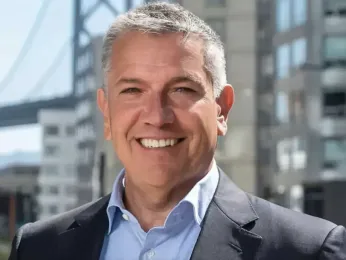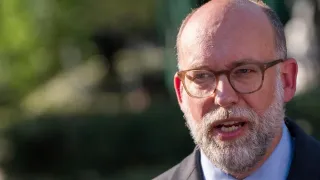
July 24, 2025
Gay SF supe Dorsey’s call to end same-sex partners benefit law sparks shock
Cynthia Laird READ TIME: 7 MIN.
Gay San Francisco Supervisor Matt Dorsey says it is time to consider repealing the city’s landmark law that required companies provide unmarried same-sex partners the same benefits as their married heterosexual colleagues. With the country marking the 10th anniversary of same-sex couples having the right to wed, and domestic partnerships largely anachronistic, Dorsey is questioning the need for city officials’ continued implementation of the law.
His floating repeal of what is known as the equal benefits ordinance (EBO), however, was met with shock from the law’s initial author. And the District 6 supervisor also received criticism from other LGBTQ leaders that now is not the time to do away with the groundbreaking statute.
The EBO, which the Board of Supervisors approved in 1996, requires companies doing business with the city to offer the same benefits to same-sex couples in domestic partnerships as married heterosexual couples since same-sex marriage wasn’t legal at the time. It does not require companies to offer benefits, but if they do, those benefits must be offered equally to their employees. It went into effect in June 1997.
Dorsey, in two phone conversations with the Bay Area Reporter in recent days, insists that the city’s contracting process has become too onerous and that the city is spending too much money on contract compliance for things like the EBO. Similar arguments were made by Dorsey and his board colleagues in 2023 when they ended the city’s ban on contracting with companies based in states with anti-LGBTQ laws, as well as restrictions on abortion access and voting rights.
Although Dorsey told the B.A.R. that he does not have legislation drafted to similarly junk the EBO, he is looking at doing so. One approach he is considering is not to repeal the EBO but suspend its enforcement unless Obergefell v. Hodges, the 2015 U.S. Supreme Court decision that legalized same-sex marriage nationwide, is overturned. When the court overturned Roe v. Wade three years ago, Justice Clarence Thomas mentioned in his concurring opinion that the court should revisit Obergefell.
“I want to be thoughtful,” Dorsey said. “But I do think we Democrats have to have a conversation to make government more efficient and effective.”
Dorsey said that one example of a company coming afoul of the EBO is from 2005, when he tried to get a contract with Intranets.com (before it was acquired by WebEx) for the city attorney’s office, where he worked at the time. The company, he wrote in a text, was based in Massachusetts, which had marriage equality since 2004, and it didn’t offer domestic partner benefits because it was in a marriage equality state. Thus, it was not in compliance with the EBO, he noted.
“From the data I’ve seen, only about 45% of large firms in the U.S. offer domestic partner benefits today – and the numbers are declining in the post-Obergefell era,” Dorsey stated. “That means 55% of large firms – and who knows how many small firms – are banned from even bidding on goods or services contracts with San Francisco.
“When competitive bidding is made less competitive, the goods and services taxpayers contract for are more expensive,” he added. “I would be the first to argue that the added expense was entirely defensible when the underlying principle of the equal benefits ordinance was equity for same-sex couples who were legally denied access to marriage. It is not defensible today.”
On Tuesday, Dorsey sent a letter to the supervisors’ legislative analyst’s office requesting information on the estimated costs to taxpayers for EBO provisions and to assess the actual enforcement and compliance costs to city taxpayers.
Dorsey did acknowledge that the fate of Obergefell is an issue, particularly with President Donald Trump in office and the six-person conservative supermajority on the Supreme Court.
“We spent years arguing that domestic partners aren’t acceptable,” he said, referring to the push for marriage equality that kicked off in earnest in 2004 after then-mayor Gavin Newsom ordered city officials to issue marriage licenses to same-sex couples.
“I don’t see it as a gay issue anymore,” Dorsey said of the EBO. “Today’s equal benefits ordinance has nothing to do with LGBTQ+ equality, and hasn’t since 2015.”
Shock and surprise
Gay former supervisor and state assemblymember Tom Ammiano, the author of the EBO, strongly disagreed with Dorsey.
“It’s very disturbing to hear, especially from a gay man,” Ammiano told the B.A.R. in a phone interview July 24. “Harvey Milk always said you’ve got to always look over your shoulder. It’s very disturbing that someone from our community thinks an ordinance like this isn’t worth it.”
Ammiano also pointed out that many seniors, LGBTQ and straight, opt for domestic partnerships later in life for financial reasons.
“It’s ill-advised, to say the least,” Ammiano said of Dorsey’s potential legislation. “We do not have heterosexual privilege, we will always be vulnerable.”
Former supervisor Leslie Katz, a lesbian, was surprised when contacted by the B.A.R.
“Wow,” she said.
An original co-sponsor of the EBO, along with lesbian former supervisor Susan Leal, Katz said Dorsey’s being short-sighted. She also said the compliance issues with the EBO aren’t that complicated, or at least weren’t when she was in office in the late 1990s and early 2000s.
“It was simple, you checked a box,” she said, adding that if a company wasn’t in compliance then the forms to complete were more involved. She suggested the city might need to clean up its forms if compliance has become such a bureaucratic issue.
“If a company doesn’t offer benefits to anyone they’re in compliance,” she said of the law, adding that if the company does offer benefits they must be offered equally, and that includes to same-sex couples.
Jeff Sheehy, a gay man and former District 8 supervisor, was one of the public faces of the EBO fight, which came to a head when United Airlines at first balked about providing equal benefits to its employees. He and others staged protests outside of United’s downtown San Francisco ticket office complete with a costumed purple Tinky Winky, part of the “Teletubbies” TV characters that were popular at the time. The late Reverend Jerry Falwell said the felt characters were turning children gay.
“Why are we going backward?” Sheehy asked in a phone interview when told by the B.A.R. of Dorsey’s proposal. “Why are we closing a door we may need?”
Sheehy said that the EBO was groundbreaking because it forced companies to start providing benefits to domestic partners in states outside of California.
“Bank of America was the first employer in North Carolina to offer domestic partner benefits,” Sheehy said. “We got the entire airline industry to comply.”
Gay Board of Supervisors President Rafael Mandelman was also contacted by the B.A.R. and was noncommittal on Dorsey’s plan. Mandelman acknowledged that the EBO was a big success but also noted that the “number of social policies baked into procurement” is “cutting out lots of companies.”
He has made contracting a priority, and was especially upset that the supervisors sent a proposal back to committee at its July 15 meeting that would have streamlined contracting rules. The proposal before the supervisors aimed to simplify the process for contracts under $230,000 by removing a litany of disclaimers that contractors – large and small – must currently agree to before doing business with the city, as the San Francisco Chronicle reported. Mandelman hoped it would address years of complaints from vendors about the city’s cumbersome requirements.
“My legislation was pretty modest,” he said.
His proposal set a threshold of removing social policies from smaller contracts – those under $230,000.
“Lower-level contractors have less effect on corporate behavior,” Mandelman said.
In recent years the supervisors have revisited several ordinances related to the LGBTQ community that they felt were no longer necessary. At the behest of Mandelman, the board scrapped various sections of the city’s municipal code seen as hindering the return of traditional gay bathhouses, which had shuttered at the height of the AIDS epidemic due to the rules imposed on them like not having locked doors.
The repeal of those codes was largely embraced by LGBTQ community leaders. The first such business to take advantage of the code changes is awaiting a hearing before the city’s planning commission to receive the necessary permits.
There was more opposition two years ago when the board repealed the city’s ban on both contracting with businesses in, and paying for city employees to travel to, the states that fell under what was known as the 12X policy, mostly from LGBTQ business leaders concerned doing so would negatively impact the owners of small, local companies. The rationale that repeal would increase bidder competition for city contracts, and result in less costs for them, won out.
The state of California also repealed its travel ban to states with anti-LGBTQ laws and was supposed to replace it with a public ad campaign in the conservative states. So far, that campaign hasn’t materialized. Newsom, now the state’s governor, noted when he signed the legislation ending the travel restrictions that no state had repealed its anti-LGBTQ laws due , which was a point of the ban.
California continues to maintain a state-based registry for domestic partnerships. Rather than eliminate it, state lawmakers over the years have expanded access to the officially recognized unions to all partners regardless of their sexual orientation over the age of 18.
As for San Francisco’s domestic partnership law, Ammiano said that he hopes Dorsey will drop the idea of excising it from the municipal code.
“This was hard-fought for,” he said.
Updated, 7/29/25: This article has been updated to state that Supervisor Dorsey has sent a letter to the board's legislative analyst's office requesting informaiton on EBO costs to taxpayers.



